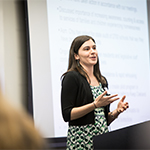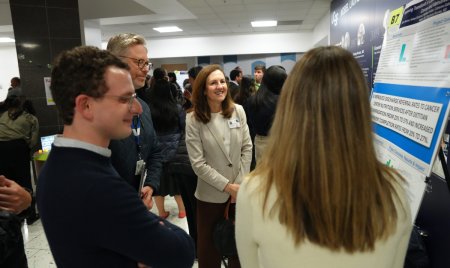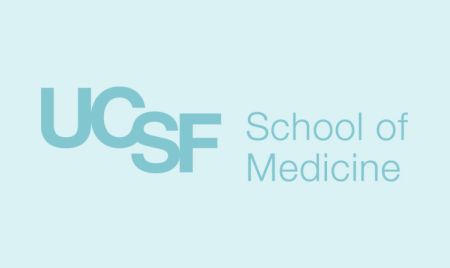Faculty News
Six Novel Curriculum and Research Efforts at UCSF
May 14, 2019
| By Lynnea Mills, MD
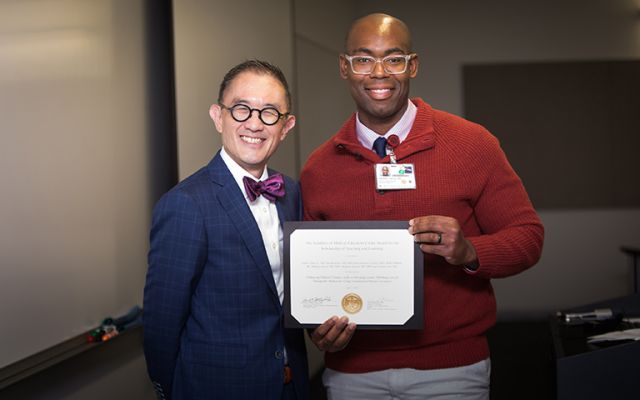
From left: AME member Kewchang Lee, MD presents Stanley Vance, MD with the 2019 Cooke Award for Scholarship. Photo by Elisabeth Fall
Kewchang Lee, MD and Stanley Vance, MD
The Education Showcase’s plenary session was a collection of presentations on innovative work, spotlighting several key areas in UCSF’s ongoing education efforts.
|
|
Stanley Vance, MD, presented on a novel curriculum on gender-affirming communication skills for learners rotating on Adolescent Medicine. The curriculum development process was designed to mimic filmmaking, from pitch to production, and involved use of standardized patients to engage learners with core communication skills around transgender health, followed by targeted feedback from faculty and actors. Participants greatly enjoyed the curriculum, and also demonstrated improved self-efficacy with the communication skills. This important work earned Dr. Vance and his colleagues the Cooke Award for the Scholarship of Teaching and Learning. |
|
|
Elizabeth Griffiths, MD, MPH, described her team’s work on legislative advocacy, highlighting a new curricular effort to empower residents in the Pediatric Leaders Advancing Health Equity program to engage with local organizations, as well as legislators, around issues that impact patients’ health. The residents advocated around issues of housing and homelessness, and one legislator is now considering legislation based on the residents’ input. Take-home message: residents CAN impact legislation! |
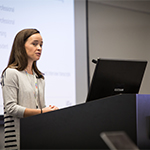 |
Kathryn Robertson, MD, conducted crucial research on how learners receive interprofessional feedback. Nurses and pediatrics residents participated in interprofessional simulation followed by intrapersonal, and then interprofessional, debriefings. Nurses were reluctant to give constructive feedback to residents, though residents expressed a desire to hear it, so further research will investigate these barriers to promote the development of interventions to enhance interprofessional feedback. |
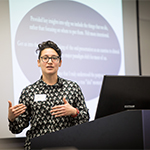 |
Sarah Schaeffer, MD, MPH, called upon Social Cognitive Career Theory to inform discussion of her project on equity. In this curriculum, the Academic Leadership Academy Summer (ALAS), underrepresented-in-medicine (UIM) second-year medical students participate in a voluntary program to enhance their clinical skills; the program boosts those skills and also enables students to work with and feel inspired by faculty who are also UIM, enabling them to “feel like we could be one of them one day.” |
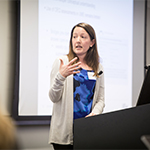 |
Susan Wlodarczyk, MD, shared exciting work examining the faculty perspective on writing open-ended questions (OEQs) for the Bridges curriculum. Faculty members felt the writing process contributed to increased collaboration and integration of content, and they appreciated the opportunities to gain better insights into students’ understanding, as well as better feedback for themselves around their teaching, compared to multiple-choice questions — next step: the student perspective on OEQs. |
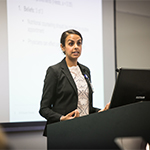 |
Diana Thiara, MD, and her colleagues’ project was rooted in research showing there’s significant room for improvement in how clinicians and learners talk with patients about nutrition. Dr. Thiara’s team tackled this gap with an innovative curriculum to bring second-year medical students into the kitchen and the classroom for both hands-on activity and case discussions, resulting in improved self-efficacy and intention to change their behaviors and their counseling of patients. |
Huge thanks to all the presenters and the collaborators of their wonderful work. We look forward to seeing what’s next for each of these projects.
Access the plenary sessions and keynote address (advance to 18:08 mark)

